Safety incidents in the workplace cannot always be prevented. However, employers are required to ensure their staff has the right training for the job. See here about how ACUTE provides the best and most hands-on fall arrest training to help safeguard your staff from injury and protect employers against regulatory sanctions. This post focuses on how organizations can provide the best fall arrest training: by getting the right content, having an experienced trainer that can point out risks before they become issues, and how there is no substitute for training with hands-on use of equipment.

Testing of Personal Fall Arrest Systems
Fall arrest is defined as the safe stopping of a person that is already falling, and it is an important topic in ACUTE’s fall protection training. There are many types of personal fall arrest systems. Knowing the situations to employ these tools is a foundational step in getting geared up for fall protection. Check out this great video below on fall protection and personal fall arrest systems!
Key Challenges for Fall Arrest Training Effectiveness and an ACUTE Response
Employers who are aware of the challenges encountered when providing or sending staff to receive training must navigate these challenges to effectively reap the benefits of their investment.
Need to Minimize Training Costs
Without proper training, employee injury could result, or simply having “shelf knowledge” may not provide tangible workplace safety. This often results in additional costs to be incurred for retraining staff. ACUTE has a proven training program and is approved by the Ontario Chief Prevention Officer as an Approved Training Provider.
Need for Contextualized Learning
Correlation between training environment and the workplace is key to translating cognitive knowledge into applied best practices. ACUTE tailors its fall arrest program and delivers training at your workplace.
 See what our customers have said about ACUTE’s training:
See what our customers have said about ACUTE’s training:
“ACUTE’s trainers have a passion for the material and care about their clients.”
– Rob, Tank Manufacturing Company – For more testimonials, see here.
Record Keeping in Case of Government Audit
Managing a business creates significant amounts of paperwork and administrative overhead. ACUTE provides record keeping for courses your employees have taken with our team, free of charge.
Training that Prepares for Unexpected Workplace Incidents
The saying, “you don’t know what you don’t know” rings true, and it is imperative to help staff prepare for scenarios that have not been encountered. ACUTE offers training at our first-class facility to help simulate new scenarios to prepare staff for unexpected falls.
Fall Arrest Training – Quick Tips
ACUTE’s Working at Heights (WAH) training course includes many practical components, including fall arrest training. If you are looking for WAH and fall arrest training, here are some quick tips that you should know.
- Ontario Regulation 213/91 – Construction Projects governs construction work, including working at heights. Working At Heights training is mandatory for any construction project workers who use any of the following methods of fall equipment including fall arrest systems and more. Click here for more information.
- If WAH training is not required for your job, many industries still find it useful. Those working in industrial, mining, or health care sectors will find WAH course content helpful for their field.
- WAH training lasts for three years. After that, a refresher training course is required.
- There are new WAH training standards in Ontario. All workers must be trained on new WAH standards by April 1, 2017. However, a 6-month extension has been put in place for experienced workers who have completed fall protection training prior to April 1, 2015.
- Workers cannot take just any WAH/fall protection training. They must complete a training course that is CPO-approved – the course itself must be CPO-approved, as well as the training provider.
(Ontario Ministry of Labour, Immigration, Training and Skills Development Source) - There are many types of fall protection, including guardrails, fall restraint systems, fall arrest systems, and safe work procedures. Understanding fall protection hierarchy is important.
Online Training VS Hands-On
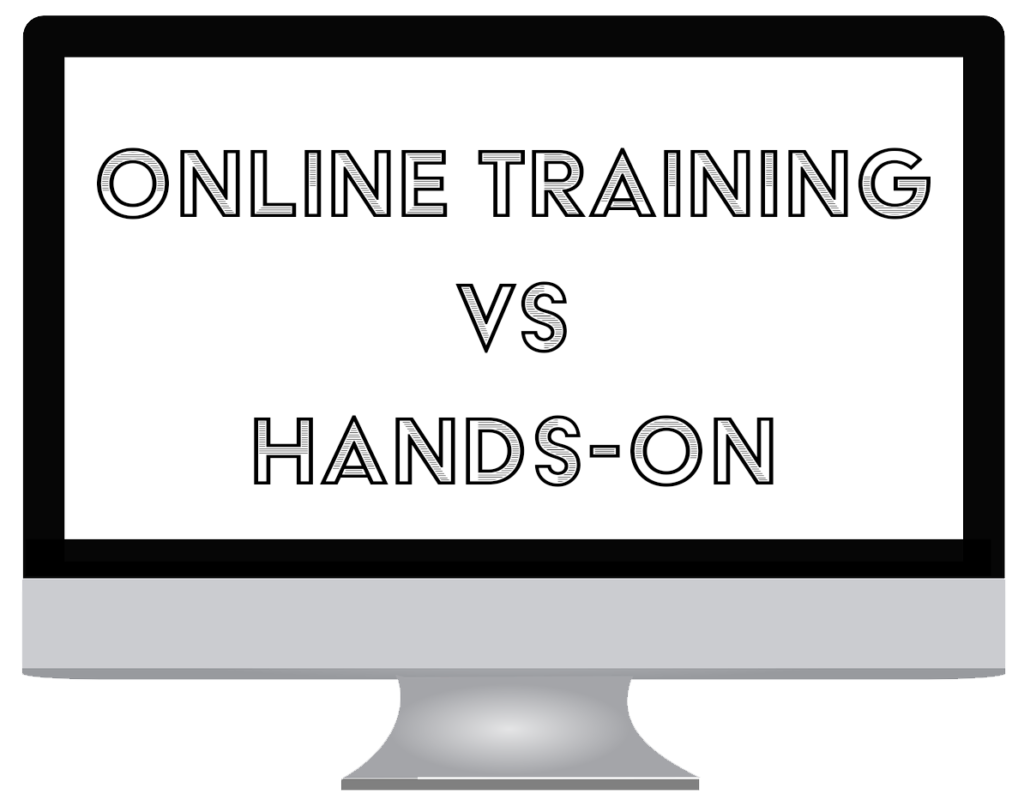
Online fall arrest/WAH training may seem appealing, as it’s easy, convenient, and quick. However, there are many limitations with online training. Learning how to stay safe on the job is more than just reading legislation or watching instructional videos. Hands-on training is the best way to keep everyone safe on the job. Here are some facts about online training:
- Online training has been proven to provide a lower quality of translatable work experience and makes it more difficult for workers to retain information they’ve learned.
- Online working at heights may appear to be quicker and cheaper; but with accidents, injuries, retraining, and rehiring costs; the total cost of training online may end up costing more in the end than hands-on.
- Online training may not be CPO-approved. If you provide or complete training that was not offered by an approved provider, the training is not equivalent and will not meet labour requirements. Your company could face fines, and your professionals will not be adequately trained.
Did you know that Ontario companies spent $52M paying for work-related compensation and other losses in 2015, on workplace fall injuries alone? That’s why receiving proper training before working at heights is so important. It is nearly impossible to fully understand how to use a fall arrest system without receiving hands-on training, especially for inexperienced workers.
Why Get Fall Arrest Training with ACUTE
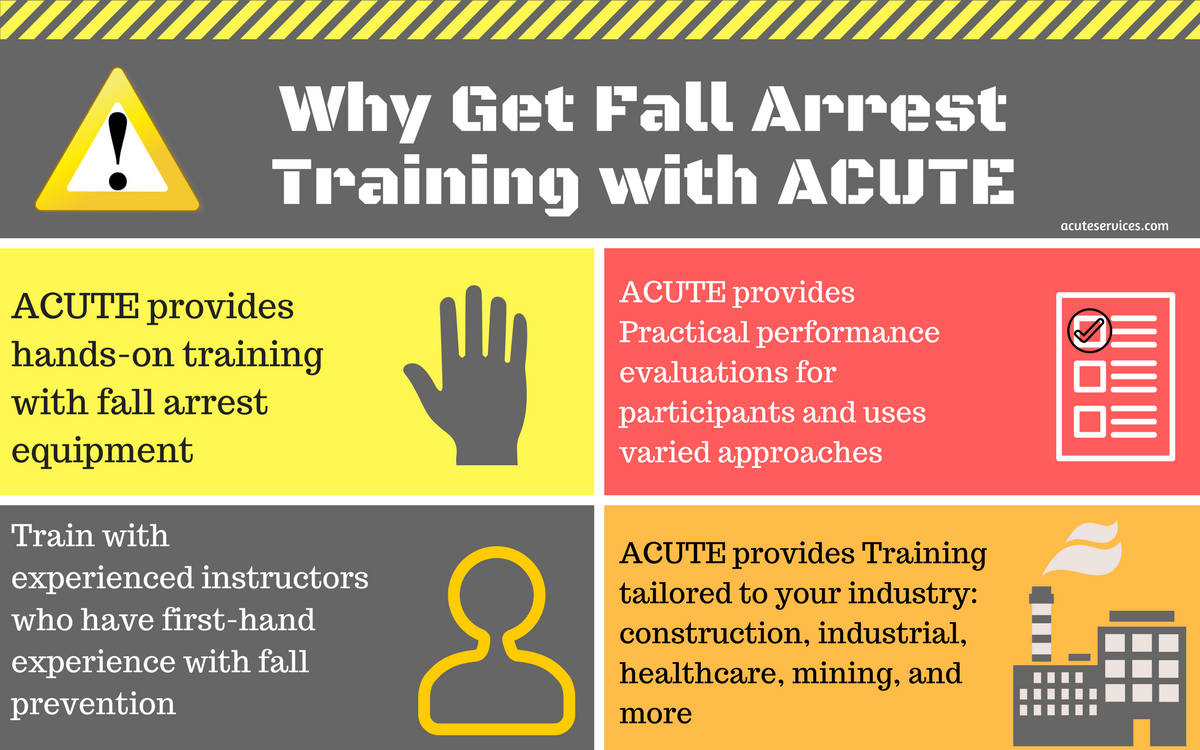
For other great reasons why ACUTE provides exceptional fall prevention training, see here.
ACUTE’s Comprehensive Courses To Meet Your Needs
At ACUTE, we offer a number of fall protection training courses, to meet you where you are:
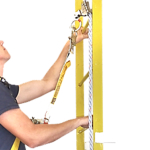
Fall Prevention Training Course
In this course, we teach how to identify fall hazards, how to control fall hazards, how to use ladder safety, how to conduct a lanyard inspection, and how to conduct a harness inspection. In addition, the course also covers fall prevention strategies, fall prevention systems, fall protection systems, rescue plans, and safe anchoring.
Training Locations: On-site/ACUTE training facilities
Industries: Industrial Establishments, Mining Operations, Health Care and Residential Facilities sectors, or Non-Construction
Time Required: 1/2 day 4 hours
Learn more about this course – click here
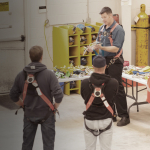
Working At Heights Training Course – Approved by The Chief Prevention Officer of Ontario
In this course you will learn the working at heights legislation, working at heights hazards, fall prevention strategies and systems, fall protection systems, safe work strategies, and how to select and use the proper fall protection equipment. To view the Ontario working at heights standards and requirements, click here.
Training Locations: ACUTE training facilities
Industry: Construction
Time Required: 1day 8 hours
Learn more about this course – click here
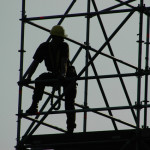
Hazard Awareness for Scaffold Workers
This program focuses on safe practices when using scaffolds as work platforms. Scaffold use can present many dangers to workers who are unaware of or inattentive to safe scaffold procedures. Despite the dangers, working on a scaffold can be straightforward and safe if users are trained and follow safe assembly, use, and dismantling procedures. The program covers understanding load capacities, anchoring and securing, the use of personal protective equipment, safe use practices, and rescue planning.
Training Locations: On-site/ACUTE training facilities
Industries: Industrial Establishments, Mining Operations, Residential Facilities sectors, and Construction
Time Required: 1/2 day 4 hours
Learn more about this course – click here
ACUTE Environmental & Safety Services is located in Waterloo, Ontario and services customers from the cities such as Toronto, Mississauga, Brampton, Hamilton, Milton, Kitchener, London, and Guelph as well as a large list of other cities from across Ontario and North America.
ACUTE’s Fall Arrest Training – Course Content
For more information about ACUTE’s fall arrest and working at heights training course, click here.
Objective: The purpose of a working at heights training program is to:
- Strengthen workplace safety culture by elevating the profile and importance of preventing falls from heights.
- Provide workers who may be exposed to the hazard of falling with adequate knowledge about fall hazards and general safety practices to work safely at heights.
- Provide workers who use personal fall protection equipment with sufficient knowledge about its purpose and use; and
- Reduce the number of fall-from-heights incidents, injuries, and fatalities.
Training program topics include:
Working at Heights (Theory Module 3h)
- Working at Heights
[WAH] and legislation
- WAH hazards
- Safe Work Plans & assessing and controlling WAH hazards
- The hierarchy of controls – application to WAH
- Fall prevention strategies and systems
- Fall protection systems
- Ladder safety
- Written evaluation
Working at Heights (Practical Module – 4h)
- Fall prevention/protection system requirements and limitations
- A-B-C component selection, inspection, use
- Harness inspection and fitting exercise & evaluation
- Lanyard inspection exercise and evaluation
- Travel restraint, fall arrest set-up exercise & evaluation
- 100% tie-off exercise and evaluation
- Ladders, scaffolds, and elevating work platforms
- Rescue plan – components and purpose
- Safe work strategies and safe anchor exercise
- Written evaluation
You will learn by:
- Classroom interaction with experienced instructors
- Table top scenarios and hands-on exercises
- Demonstration and hands-on training in the care and use of equipment
- Detailed handouts, videos, and quizzes
- Practical performance evaluations
Join our vision of managing towards Zero Incidents in Ontario! Get proper training today!

